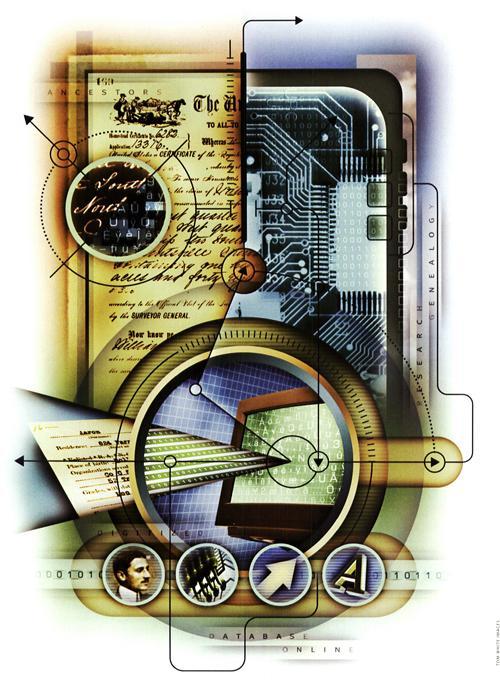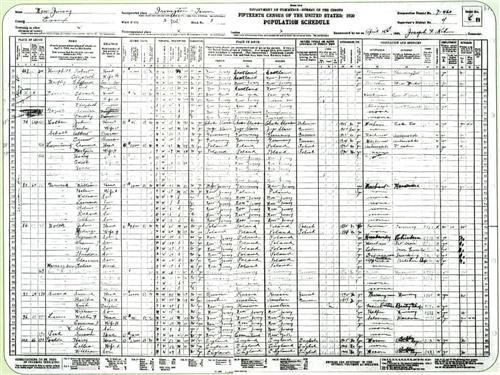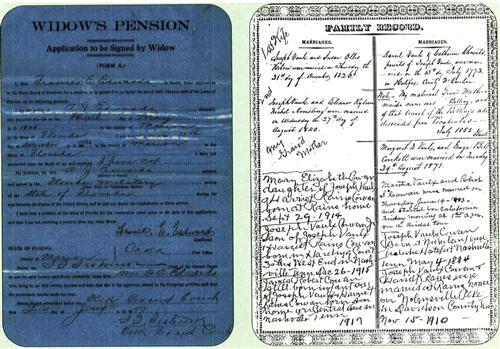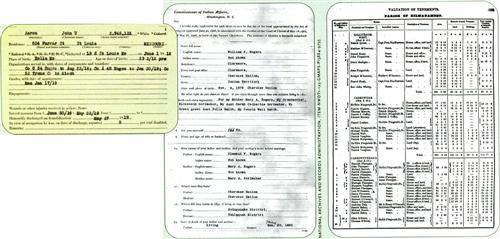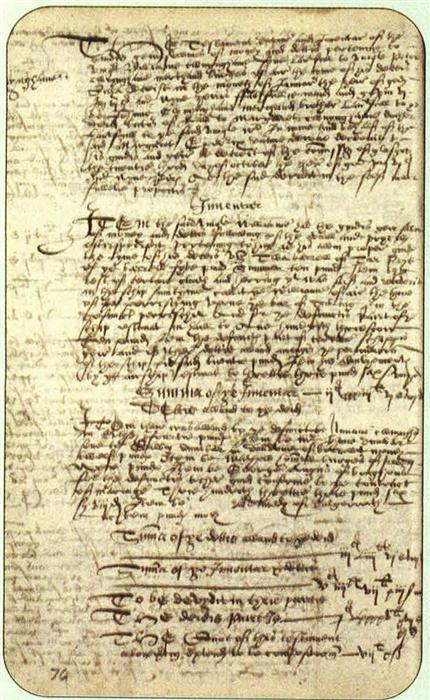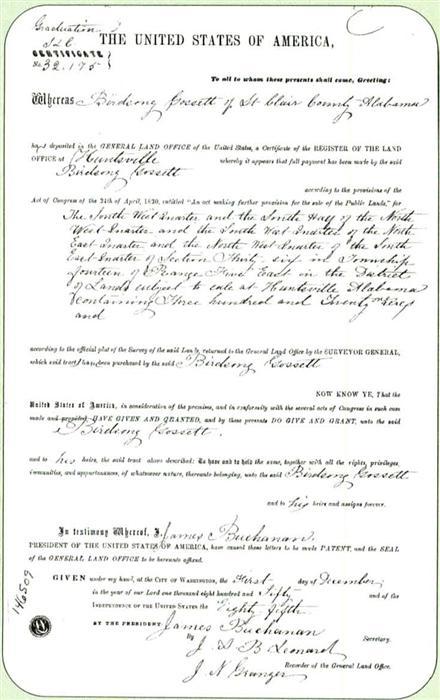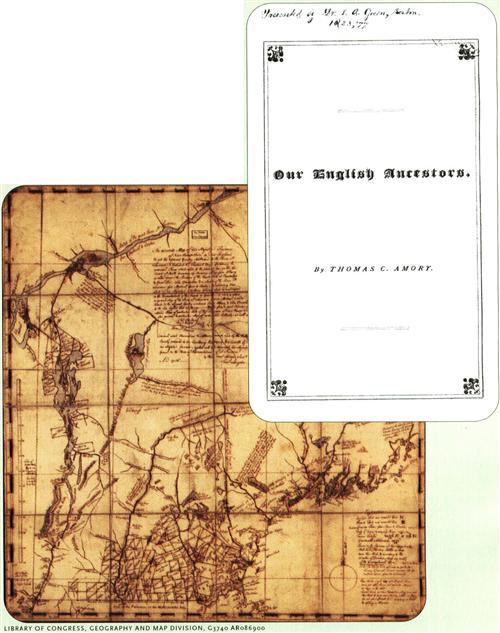Sign up for the Family Tree Newsletter Plus, you’ll receive our 10 Essential Genealogy Research Forms PDF as a special thank you!
Get Your Free Genealogy Forms
"*" indicates required fields
Web-wary family historians sometimes scoff at the notion of Internet genealogy. You can’t do real research online, they insist. Well, we have news for those naysayers: Times have changed. Over the past few years, commercial companies, state agencies, genealogical societies and individual researchers have joined in a feverish rush to put valuable genealogy material online.
We’re not talking about links to library catalogs, instructions for ordering records offline or undocumented assertions about your family tree. Today, the Web holds the same kinds of treasures you’d find at the library or courthouse — data once found only in manuscripts, books and microfilm. You’ll come across everything from state vital-records indexes and gravestone transcriptions to digitized 19th-century newspapers and maps of your ancestors’ town. You can access the entire US census and every Ellis Island passenger list, full military pension files and even foreign countries’ records.
The trick is surfing the sites with the best, most reliable sources. So to steer your mouse in the right direction, we picked 50 of the Web’s top genealogy databases and database collections. Some come at a price, but most are free. Given these databases’ scope and size, there’s a good chance they contain real answers about your ancestors. Genealogy nirvana awaits you — and you need go no farther than your computer.
Mega data sites
<Ancestry.com >
Web-genealogy behemoth Ancestry offers subscriptions featuring digitized original records, transcriptions and indexes. You can buy a year’s access to the entire site for $189.95, or sign up for these record collections individually:
Historical Newspaper Collection — Search for any word in dozens of newspapers from across the United States, and view the actual page images on your computer screen. Subscriptions run $29.95 for three months or $79.95 for one year.
UK & Ireland Records Collection — Databases include Parish and Probate Records, with information on 15 million people from 1538 to 1837; the Pallot Marriage and Baptism Index, covering 4 million names from England; and an index of 600,000 Irish immigrants who arrived in New York between 1846 and 1851. Access to the UK and Ireland databases will cost you $39.95 for three months or $99.95 for a year.
US Census Images & Indexes — Ancestry was the first site to offer online access to the complete US census: digital images of all population schedules from 1790 to 1930. Now Ancestry is creating indexes to the entire collection. The price of a subscription is $39.95 quarterly or $99.95 annually.
US Records Collection — Search more than 3,000 databases ranging from military service records to finding aids such as the Periodical Source Index (PERSI) and the American Genealogical-Biographical Index. It costs $29.95 for three months or $79.95 each year.
FamilySearch
This popular free Web site from the Church of Jesus Christ of Latter-day Saints (LDS) features several major databases:
Census Records — FamilySearch’s census database covers 50 million names in the 1880 US census, 4.3 million names in the 1881 Canadian census and 30 million names in the 1881 British census. Each transcribed individual record links to the next person on the census schedule and a whole-household entry; you also get the roll number for the microfilmed original records, which you can order from the LDS’ Family History Library.
International Genealogical Index (IGI) — Access millions of worldwide birth and marriage records spanning 1500 to 1885. Many — but not all — IGI entries are extracts of actual vital records; the rest come from submissions by LDS members.
US Social Security Death Index — Search 64 million records.
Vital Records Index — Tap indexes to Mexican and Scandinavian births, christenings and marriages. The Mexico database contains about 2 million index records; Scandinavia’s boasts 4.6 million.
Genealogy.com’s original claim to fame (aside from its best-selling software, Family Tree Maker <www.familytreemaker.com>) was data CD-ROMs. Now it’s transferring that prolific CD data to its Web-site databases and, partly through a partnership with Pro-Quest <www.proquest.com>, offering images of actual records. Its subscriptions feature books, passenger lists and census images:
Family and Local Histories — Access loads of family and local history books, as well as rare genealogical journals, atlases and primary sources — all fully digitized and searchable — for $14.99 per month or $79.99 for a year.
Genealogy Library — Discover a wealth of genealogical data in this database, which includes genealogies, town and county histories, 1850 census images and military, marriage, probate, church and other records. Access to this database runs $9.99 monthly or $49.99 annually.
International and Passenger Records — This collection documents millions of immigrants from Great Britain, Germany, Italy, Russia and other countries. Data comes from passenger lists, published works and other sources. Subscriptions cost $14.99 per month or $79.99 for a year.
US Census Collection — Page images of all US federal censuses from 1790 to 1910 are being placed online with indexes (1920 and 1930 will be added later). Subscription prices are $19.99 per month or $99.99 per year.
A $149.99 annual membership buys you access to two of these collections: Genealogy Library and the international collection. You also get the 1900 census (alas, not the entire collection), along with World Family Tree, a database of user-submitted genealogy files, and a copy of Family Tree Maker.
New England Ancestors
Members of the New England Historic Genealogical Society (NEHGS) can access dozens of databases on the society’s Web site, including these resources:
The Great Migration Begins: Immigrants to New England, 1620-1633 — The Great Migration Project aims to compile all prior research on early New England immigrants. NEHGS has published three volumes so far and posted the data online.
New England Historical and Genealogical Register — Search the full text of NEHGS’ journal, which has published thousands of genealogies. Issues from its inception in 1847 to 1994 are online.
An annual NEHGS membership costs $60. Besides the online databases, you get subscriptions to two print sources: New England Ancestors magazine and The New England Historical and Genealogical Register.
RootsWeb
When searching Roots Web’s abundant free mailing lists, cemetery records and military records, don’t overlook these key databases:
Death Records — Search millions of death records from California (1940 to 1997), Kentucky (1911 to 2000), Maine (1960 to 1997) and Texas (1964 to 1998) at <searches.rootsweb.com>.
Obituary Daily Times — Visit <obits. rootsweb.com> to check an index to more than 8 million obituaries across the United States, most from 1996 to the present.
USGenWeb
Through the efforts of volunteers nationwide, this extensive network has quickly become a key destination for genealogists. Don’t overlook any of the project’s main parts:
Archives — Here you can view transcribed records from every state. Use the search engines to find a name in a specific state’s files or anywhere in the entire collection.
Census Project — The goal of these ambitious volunteer efforts is to transcribe all US census records from 1790 to 1930. Some transcriptions include links to page images.
State Pages — These are the jumping-off points to county pages, where you’ll find gravestone transcriptions, church records, indexes to wills and much more.
Tombstone Project — Here you’ll find gravestone transcriptions from cemeteries across the country.
For similar record collections from Canada and other countries, check out World GenWeb at <worldgenweb.org>.
State sources
Delaware Public Archives
Click on Collections to search naturalization and probate records. Select Digital Archives to view page images from several collections, including orphans-court cases, slave papers and Civil War records.
Florida Confederate Pension Application Files
<dlis.dos.state.fi.us/barm/PensionFiles.html>
Part of the state archives’ Florida Memory Project, this database searches 14,000 pension applications granted to veterans and widows beginning in 1885. The electronic records link to downloadable images of the pension files; you also can order hard copies for $7.50.
Georgia Civil War Pension Records
<docuweb.gsu.edu/CivilWar.htm>
Georgia State University is digitizing the state archives’ Confederate pension-record collection; you can browse images of the records here. They’re arranged by county — select one of the nine available counties, then a veteran’s or widow’s name to view the pension file page by page. You can download PDF versions for printing.
Illinois State Archives Databases
<www.library.sos.state.il.us/departments/archives/databases.html>
Researchers with Illinois ancestry will find a treasure trove of information in these databases. Statewide indexes cover marriages from 1763 to 1900 and deaths from 1916 to 1950. Military databases contain names of Illinois veterans of the War of 1812, Winnebago War, Black Hawk War, Mexican War, Civil War and the Spanish-American War. Indexes to county birth, naturalization and probate records round out the collection.
Library of Virginia
This tremendous site features 80-plus databases, indexes and finding aids. Key resources include indexes to marriage records dating from 1630 and death records from 1853 to 1896. Military indexes cover Revolutionary War bounty land warrants, War of 1812 pay and muster rolls, and Confederate pension rolls. Indexes to land patents and grants from 1623 to 1992 are linked to images of the original documents. You can even view images of pages from family Bibles. These records grew out of the Digital Library Program, unfortunately a victim of recent budget cuts — see <www.lva.lib.va.us/whatwedo/digital.htm>.
Maryland State Archives
You’ll find several searchable databases here. Click on Reference & Research, and then Electronic Indices to access census and death-record indexes. Go to <www.mdarchives.state.md.us/msa/stagser/s1500/s1527/html/ssi1527.html> to search marriages abstracted from materials at the Maryland State Archives. At <www.mdarchives.state.md.us/msa/stagser/s1400/s1402/html/ssi1402.html> you’ll find the Maryland Church Records, Deaths and Burials Index from 1669 to 1967.
Michigan Genealogical Death Indexing System
<www.mdch.state.mi.us/pha/osr/gendisx/index.htm>
GENDIS, from Michigan’s Division of Vital Records and Health Statistics, provides complete transcriptions of 170,000 death records covering 1867 to 1884. Records include the name, date and place of death, age, marital status, cause of death, occupation and parents’ names and residences.
Minnesota Death Certificates
The Minnesota Historical Society’s index to Minnesota death certificates covers 1908 through 1996. You can get a copy of a death certificate for $8 or borrow microfilmed death records on interlibrary loan: It costs $3 per roll plus $2.50 shipping and handling on each order (up to six rolls).
Missouri World War I Military Service Cards Database
Search 145,000 transcribed service cards for Missourians who served in the US Army and Marines, plus images of 18,500 US Navy service cards.
Pennsylvania Archives Records Information Access System
<www.digitalarchives.state.pa.us>
Databases on this site focus on Pennsylvania soldiers in the American Revolution, Mexican War, Spanish-American War and World War I. About 200,000 of 500,000 service cards have been scanned and placed online; the rest will be added soon.
Foreign and ethnic databases
1901 Census Online
The UK Public Record Office (PRO) Web site hosts a complete transcription of the 1901 British Census, which contains data on more than 32 million people. You can search the index for free, but its costs about 75 cents to view a person’s full details and about $1.15 to view an image of the original census page. There’s a minimum charge of about $7.75 per session. Although you can search the database anytime, the PRO limits researchers to two hours of continuous use.
Access Genealogy
Access Genealogy’s myriad resources include databases and links for research in every US state and several foreign countries. Its Native American databases, the largest such collection online, include everything from the Final Rolls of the Five Civilized Tribes and Native American land patents to the 1871 Shawnee census and the 1880 Cherokee census.
Archival Research Catalog
<www.archives.gov/research, room/arc>
The National Archives and Records Administration (NARA) has posted only a handful of its vast holdings online, but that includes some major Native American records — Indian censuses from 1885 through 1940 and the Dawes Rolls, applications for enrollment in the Five Civilized Tribes (Cherokee, Chickasaw, Choctaw, Creek and Seminole) taken between 1896 and 1914. A few alien registrations, court-case files and military records are online, too. NARA’s new Archival Research Catalog (ARC) lets you access document descriptions and, when available, digital copies. You’ll need to use specific search syntax to locate details in ARC, so be sure to read the search hints.
ArchivialMet
<www.archives.ca/02/0201_e.html>
The National Archives of Canada’s Web site features several important resources for finding Canadian ancestors, including an index to World War I personnel files, western land grants from 1870 to 1930 and immigration records from 1925 to 1935. You’ll also find geographically browsable page images of the 1901 census. No national index has been created yet, but the 1901 census of Alberta has an index online at <www.agsedm.edmonton.ab.ca/census.html>; a volunteer project at <automatedgenealogy.com> has indexed parts of that census for New Brunswick, Nova Scotia, Ontario and Quebec.
Arkion’s Swedish Census Database
Surf here to access the 1890 and 1900 Swedish censuses online. Arkion, a division of Sweden’s national archives, has posted searchable transcriptions containing more than 6.2 million names. One three-hour login costs about $4.25, and 10 three-hour logins cost about $27.
Free BMD (Birth, Marriage, Death)
This index to English and Welsh births, marriages and deaths spans 1837 to 1901. So far, volunteers have transcribed more than 42 million records. Each index entry gives you a name, quarter, year, volume, page number and sometimes, the age at death. Free BMD also tells you how to use the index information to get a copy of the original birth, marriage or death certificate.
GENUKI
This site features transcribed records from all over the United Kingdom and Ireland. You’ll find church and census records, as well as research helps such as maps, guides to local records and links to related Web sites. Everything is arranged by country, county or town. The search engine at <www.genuki.org.uk/search.html> combs the contents of all GENUKI pages plus the Family History Society and County Surname Interest List sites linked from GENUKI.
JewishGen Databases
You can tap dozens of valuable databases on this site. For example, look for your ancestors’ vital statistics in an index to more than 1.5 million 19th-century Jewish birth, marriage and death records from more than 250 Polish towns. Or track their trans-Atlantic voyage with a list of more than 44,000 immigrants from Austria, Poland and Galicia who arrived in New York in 1890.
Norway’s Digital Archive
The National Archives of Norway maintains this tremendous collection of databases. Highlights are transcriptions of Norway’s 1660, 1801, 1865, 1875 and 1900 censuses, and Norwegian natives in the 1850, 1860, 1870 and 1880 US censuses. You’ll also find emigrant lists, mostly from 1867 to 1930, probate indexes from 1677 to 1856, tax lists, military rolls and church registers.
Origins.net
The Origins network features three Web sites with resources for British Isles genealogy: English Origins’ databases tally 6 million-plus names — with more than 5 million in the Boyd’s Marriage Index (1538 to 1840). For about $9, you can access the database for 48 hours and view 150 index entries or records. Irish Origins is a free search engine that combs more than 40,000 Irish genealogy Web pages containing 2 million names. Scots Origins no longer provides access to parish registers, but its special interface to FamilySearch’s International Genealogical Index (IGI; see page 20) lets you search Scottish IGI records by parish. Genealogists of all ancestries can benefit from the network’s Web-wide search engine, Origin Search; it costs $5 a day or $15 for two weeks.
Among the Irish databases on this site, you’ll find the complete Griffith’s Valuation of Ireland, 1847 to 1864, with images of the original source documents. Placenames of Ireland lists all the towns, villages and townlands in Ireland. Membership costs range from $8 for 72 hours to $44 for a year.
ScotlandsPeople
Scotland’s official online source for church, vital and census records contains almost 37 million names. Indexes cover births from 1553 to 1901, marriages from 1553 to 1926, deaths from 1855 to 1951 and the 1881, 1891 and 1901 censuses. Access costs about $9 for 30 page credits, which are valid for one day.
Scottish Documents
This free index to more than 355,000 names in Scottish wills, testaments and inventories covers 1500 to 1875. The names are currently being linked to more than 2 million document images. A high-quality, color digital image of a will costs about $7.75.
Immigration records
The Data Banks on Italian Emigrants to the United States, Argentina and Brazil
<213.212.128.168/radici/ie/defaultie_e.htm>
Databases here cover 200,000 Italian emigrants to New York from 1880 to 1891, 1 million to Buenos Aires, Argentina, from 1882 to 1920 and 27,000 to Vitória, Brazil, from 1858 to 1899. Immigrants’ personal details have been transcribed from various passenger lists.
Ellis Island Immigration Records
This hugely popular Web site provides details on more than 22 million immigrants, passengers and crew members who came through Ellis Island and the Port of New York between 1892 and 1924. Keep in mind that the database also lists US citizens returning home from travel abroad. Once you find your ancestors on a transcribed passenger list, you can purchase an image of the actual manifest, plus ship pictures and an electronic family history scrapbook. (You’ll also find tools for combing the database at <www.jewishgen.org/databases/EIDB>.)
Finnish Institute of Migration Emigrant Register
<www.utu.fi/erill/instmigr/eng/e_rekist.htm>
Find your immigrant ancestor in more than 480,000 entries from passport and passenger records covering 1850 to 1960. The passenger records include the date and port of departure, as well as the ship’s destination. Passport records show the bearer’s birth date and the home parish and province.
Hamburg Link to Your Roots
<www.hamburg.de/LinkToYourRoots/english/start.htm>
This database lists passengers who left Hamburg, Germany, a key port of departure for European emigrants of many nationalities. All manifests for 1890 to 1891 have been digitized, and lists for 1892 to 1894 are in progress. Eventually, this site will list more than 5 million names from 1850 to 1934. Searches are free, but you have to pay for full details: $20 for information on one to three immigrations, or $30 for data on four to 10.
Immigrant Ships Transcribers Guild
Hundreds of volunteers have pitched in to transcribe the 5,000 worldwide passenger lists on this site. In all, they list more than half a million names, from Columbus’ crew on the Nina, Pinta and Santa Maria in 1492 to Yugoslavian emigrants to Australia on the SS Marconi in 1966.
North Dakota Naturalization Records Index
<www.lib.ndsu.nodak.edu/database/naturalrec.html>
The 212,000-plus records in this database supply each immigrant’s name, country of origin, naturalization date and the court where the proceedings occurred. You can get a copy of the original record for $5.
Military databases
American Civil War Research Database
Historical Data Systems created this database to centralize information on every Civil War soldier. So far, it has records of more than 2.6 million soldiers. Most of this data comes from state rosters. Other sources include regimental histories, Rolls of Honor and the 1890 census of Civil War veterans and widows. Buy a seven-day visitor’s pass for $10 to search a soldier’s military data or subscribe for $25 annually. The database is also part of Ances-try.com’s US Records Collection, where it’s called American Civil War Soldiers, though Ancestry’s version may not be as up-to-date.
Birth Info in WWI Civilian Draft Registrations
<members.aol.com/Rayhbanks/cos.html>
If you have male ancestors who were eligible to serve in World War I, you’ll want to check this database. Even though most of them ultimately didn’t serve, men born between 1872 and 1900 had to register for the draft in 1917 and 1918. So far, this database has details from more than 1.2 million of the 24 million draft registration cards. Entries give the full name and date and place of birth. You also can search this database on Roots Web <userdb.rootsweb.com/ww1/draft/search.cgi> and on Ancestry.com .
Civil War Soldiers and Sailors System
Compiled from records in the National Archives, this database has information on 5.4 million soldiers who served on both sides in the Civil War. Other information will include regimental histories, descriptions of 384 significant battles, prisoner-of-war records and cemetery records.
The On-Line Institute for Advanced Loyalist Studies
Don’t miss this Web site if you have ancestors who remained loyal to the British Crown during the Revolutionary War. In addition to an index to Loyalist muster rolls, you’ll find regimental documents, land petitions and postwar settlement documents.
All-American records
Find A Grave
Ever wonder where Elvis Presley or Marilyn Monroe is buried? You’ll find their final resting places at this site, along with 3.9 million other cemetery records from across the United States. You can submit gravestone transcriptions and photos of people or graves, along with your contact information. You can even “visit” a grave and leave flowers and notes.
lnterment.net
Dig up details on ancestral burials here — Interment.net has more than 3.1 million visitor-contributed records from about 6,500 cemeteries around the country and world. You can browse transcriptions by county. The site also has links to gravestone transcriptions on other Web sites.
Official Federal Land Patent Records Site
Were your ancestors pioneers? Check out this database on the initial transfer of land titles (patents) from the federal government to individuals. You can view images of more than 2 million land patents issued between 1820 and J 908 in eastern public-land states (most states outside the 13 original Colonies are public-land states).
Sampubco
Searchable databases on this site include indexes to more than 300,000 wills in Alabama, Idaho, Iowa, Kansas, Maryland, Massachusetts, New York, Ohio, Oregon, Pennsylvania, Rhode Island, Tennessee and Virginia. Sampubco’s site also has indexes to guardianship records in New York and naturalization records in Iowa, Massachusetts, Missouri, New York, Oregon, Pennsylvania and Wisconsin. You can request a copy of most wills for $9 and guardianship and naturalization records for $5.
Vitalsearch
<www.vitalsearch-worldwide.com>
This massive set of databases indexes more than 70 million vital records from seven states: California births (1905 to 1995), marriages (1949 to 1986) and deaths (1905 to 2000); Florida deaths (1877 to 1916 and 1999 to 2000); Georgia marriages (1998); Kentucky births (1911 to 2001), marriages (1973 to 2001) and deaths (1900 to 2001); Oregon marriages (1999 to 2001) and deaths (1951 to 1960 and 1999 to 2001); Texas births (1926 to 1997), marriages (1967 to 2000), divorces (1968 to 1998) and deaths (1956 to 1959 and 1964 to 2000); and Washington deaths (1970 to 1974). Some of the early California indexes are hard to read and are being rescanned. More records are coming, including Alabama death records. Access to most databases is free. But paying customers ($24.95 a quarter or $57.95 a year) avoid pop-up ads and can view additional indexes.
Western States Marriage Records Index
<abish.byui.edu/specialCollections/fhc/gbsearch.htm>
Volunteers from the Brigham Young University-Idaho Family History Center extracted early Western marriage records to create this database. It indexes 270,000 nuptials, mostly pre-1940, from Arizona, Idaho, Nevada, Utah, Wyoming, eastern Washington, eastern Oregon, western Colorado and selected counties in California.
Biographical and historical sources
Accessible Archives
A subscription gets you access to the full text of major research sources for the mid-Atlantic states. Newspaper databases include The Pennsylvania Gazette from 1728 to 1800 and 19th-century African-American newspapers. You’ll also find county histories from Delaware, New Jersey and eastern Pennsylvania.
American Memory
The Library of Congress’ amazing digital-preservation project features more than 7 million items selected from its historical Americana collections. These materials encompass rare books, manuscripts and maps, as well as photographs, sound recordings and motion pictures. While you probably won’t find any records naming your ancestors, sources such as Revolutionary War-era maps, Civil War photographs and slave narratives will put your genealogy in historical context.
Making of America
<moa.umdl.umich.edu> and <moa.cit.comell.edu/moa>
A collaborative effort between the University of Michigan and Cornell University, Making of America features 3 million page images from about 8,500 books and more than 100,000 journal articles. Most date from 1850 to 1877, and access is free. The sites have different collections, including a few genealogy titles. Journals such as the Scientific American (1846 to 1869) and articles such as “History of the Presbyterian Church in Kentucky” (1847) will help you understand your ancestors’ world.
Paper of Record
Peruse the news from your ancestors’ day. Paper of Record gives you online access to actual page images of many Canadian newspapers, as well as a growing number of titles from Australia, England, Mexico and the United States. Most newspapers date from the early 1800s to the mid-1900s. A subscription costs about $6.75 a week, $16.75 a month or $167.50 a year.
World Biographical Index
This mammoth database from Germany indexes 3.2 million-plus biographies in 5,700 reference works published around the world. When you find a promising reference, take it to your local public library to request a copy of the biography on interlibrary loan.
ADVERTISEMENT

